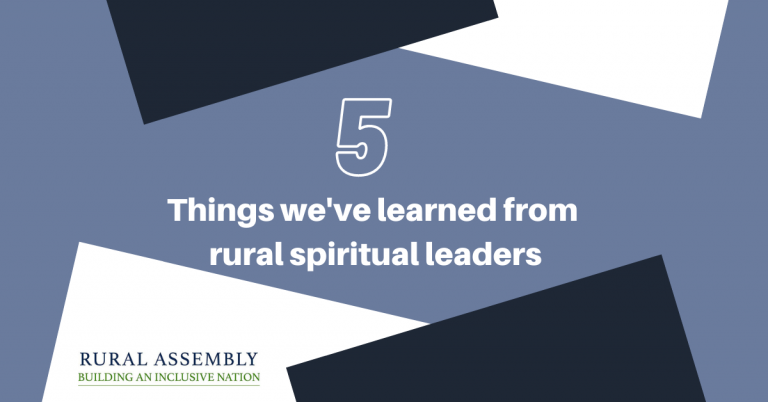Five Things We've Learned from Rural and Native Spiritual Leaders this Summer

We invited rural and Native spiritual leaders to gather virtually. Here's what we learned.
By Haley Cush
The COVID-19 pandemic and social polarization have made it difficult to remain connected, inspired, and motivated. To cope, many have turned to their faith and faith leaders for guidance and support.
In turn, these leaders have served their communities in new ways, taking on roles of health officials, community comforters, and resource distributors.
As a response to these ongoing struggles, and to support the leaders combating them, The Rural Assembly, in collaboration with Faith Matters Network, The On Being Project, and Interfaith Youth Core hosted Witness, a virtual gathering for rural and Native spiritual leaders earlier this summer.
Pastors, rabbis, and other spiritual leaders shared and connected with one another across diverse backgrounds and geographies leading to powerful narratives of faith, growth, and community.
During the discussion, we culled lessons that resonate as we continue fight this pandemic, finding ourselves searching for connection, unity, and support. Here’s what we learned from the Witness gathering.
1. We Are Not Alone
This past year has been especially hard due to physical isolation. However, as the leaders at the conference began to share, it became clear that although we were separated, a lot of the feelings and experiences we had during the past year and a half were very similar. Many of us experienced loneliness due to shutdowns, fear due to uncertainty, and hope due to other’s acts of kindness.
One participant noted that the Witness gathering itself was “a healing moment when strangers welcomed me and shared their stories and pointed me toward the hope that has been difficult to hold.”
Ultimately, through sharing experiences, we can find strength and support in others, even in the most trying times.
2. Asking Questions Helps Forge Connection
It can be tempting to avoid direct conversations about unknown or unfamiliar topics. However, the questions asked are more important than the answers sought. When we create spaces that value questions first, we pave the way for understanding and connection.
Throughout the event, people from diverse backgrounds were paired together to enable space in which questions could be asked. One interaction even culminated in an exchange of resources so learning could continue to occur even after the event had ended, demonstrating that asking questions helps us build bonds with others.
3. “Trust Before Tragedy”
During times of tragedy or great need, it is common that organizations and individuals call for help and support. As we have seen, sometimes these calls are met with an overwhelming response from neighbors and even strangers.
Reverend Benton W. Oakes of First UMC Elizabeth City and Reverend Javan Jeremiah Leach of Mt. Lebanon A.M.E. Zion Church highlighted the importance of building these bonds with those around us before support is needed, or in other words, to establish “trust before tragedy.”
If we wait to build community and only seek connections in a reactionary way, it becomes more difficult to bring people together, and the support that is given must come solely from a place of sympathy or moral obligation. Rather, we must proactively build trust to ensure strong bonds.
4. The Power of Safe Spaces
Before beginning the process of developing trust, asking questions, or opening yourself up to the support of others, a safe space must be created.
In a safe space, people are willing to open up and add to dialogue using personal goals, aspirations, and setbacks without fear of judgment or rejection. Therefore, genuine commentary and thoughts are shared, exposing others to new ideas.
Throughout Witness, participants remained dedicated to creating a safe space. This commitment was evident through asking questions, listening actively, and participating.
Ultimately, it was that safe space that allowed participants to share freely and learn from one another.
5. Faith Centers Can Act As Catalyst For Social Change
Faith centers often act as gathering places for their communities, housing everything from food drives to educational programming. These centers bring people together, and therefore can help people support one another in the face of adversity.
Prairie Rose Seminole, a citizen of the Three Affiliated Tribes of ND who serves as a political consultant and coach, shared how they brought their congregations together to inspire social change in spite of background differences. By fully embracing faith centers’ ability to bring people together, the process toward meaningful change can begin.







